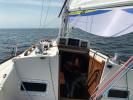C&C 27 Association Forum
This Forum is supported by C&C 27 owners like you whose membership in the C&C 27 Association makes possible this Forum and the accompanying site. Thank you, members, for your continuing commitment.
You are not logged in.
- Topics: Active | Unanswered
Announcement
If you have any problem, please do not hesitate to contact me
Pages: 1
#1 2021-12-24 09:00:56
- Ronan
- Member
Spinnaker sheet layout
Wondering what way folks generally set up the sheet and guy on their kites on their 27's (mk 1-4) - I have a trapper 500. I have never run twings/ barberhaulers or whatever you call them at mid sheet /guy, and 2 issues arise when reaching - the guy bears on the windward shroud, and on the windward guard rail. I set the sheets outside the guard rail - though for a long leg I might set a second guy on the inside instead to take the pressure off the guard rail.
Thanks
Ronan
Offline
#2 2021-12-27 10:17:47
- TalW
- Member
Re: Spinnaker sheet layout
Hi Ronan,
Our 27-3’s spinnaker setup included a pole config’d for end-for-end jibes, along with single sheets and twings run outside on each side.
The twings were led to a block/cleat assembly on the toe rail just behind the midships lifeline stanchion. There was some load on the stanchion but it was reduced and down low near the base. The spin sheet blocks were mounted on the toerail about 6’ forward of the transom to minimize load on the aft stanchions when reaching.
The twing line was about 16’ long and continuous. It ran from one sheet through the block/cleat assembly, over the cabintop then through a similar setup on the other side. No permanent hardware needed to be mounted on the deck and there were no trip hazards. The arrangement did require that someone go amidships to release or tension the twings.
I don’t have any closeups on Critical Path, but we used the same arrangement on our next boat and I found a photo of that setup.
Cheers,
Tal Wolf
ex "Critical Path” 27-3 #632
http://www.cc27association.com/f4/img/m … 6-nr5p.jpg
Offline
#3 2022-01-02 19:04:25
- carriden
- Member
Re: Spinnaker sheet layout
Hi Ronan,
Back on Carriden we did something similar to Tal's setup. There was one set of blocks on the toerail by the midships stanchion and a second set of blocks on the toerail by the cleats forward of the primary winch. On each side was a fairly short tweaker line with a block spliced into the end of it, which the spinnaker sheets ran through. The tweaker line would be run through the block at the midships stanchion, then brought back to the aft block near the primary winch, and then fastened to the cleat just forward of the primary winch. On the sheet side, the tweaker line would be allowed to run free (at least to the stopper knot in the end of the line). On the guy line, the tweaker would be pulled tight, with the riding block right down to the toerail, at the point of widest beam on the boat. This gave optimum purchase and maximum leverage for cranking back the spinnaker pole. Prior to gybing, the tweaker on the sheet would be pulled in tight and then the pole brought across the foretriangle to the new windward side, after which the tweaker on the newly established spinnaker sheet would be allowed to run free. Nobody had to leave the cockpit for this.
This arrangement served us well for many years and eliminated any strain being placed on the stanchions or lifelines. Also it was easy to remove the tweaker lines, leaving the blocks in place on the toerail, when racing was done and we were shifting back to pleasure-sailing mode. Used a red line for the port tweaker, green for the starboard, to differentiate them from the white sheet lines.
Wishing you fair winds and calm seas,
Last edited by carriden (2022-01-02 19:06:32)
Marcus Opitz,
Formerly from Carriden, Mk III, Hull #847,
now skippering "Everdina," a 1975 Ontario 32
Offline
Pages: 1

